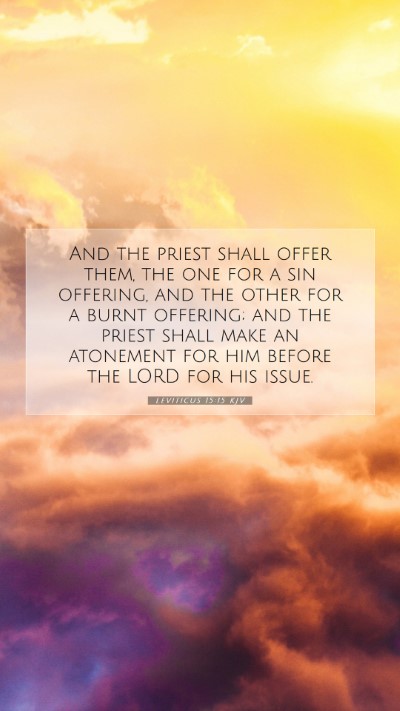Understanding Leviticus 15:15
Leviticus 15:15 states:
"And the priest shall offer them, the one for a sin offering, and the other for a burnt offering; and the priest shall make an atonement for him before the LORD for his issue."
Overview of Leviticus 15
The chapter primarily addresses the laws concerning bodily discharges and their implications for ritual purity. It seeks to provide guidelines for the Israelites on how to manage scenarios that render them ceremonially unclean. Understanding these laws is crucial for comprehending the broader theme of holiness in the Levitical laws.
Insights from Public Domain Commentaries
Matthew Henry's Commentary
Matthew Henry emphasizes the importance of purification and atonement in these verses. He notes that bodily discharges symbolize various states of sin and uncleanliness, and the subsequent offerings serve to restore the individual's standing before God. The sin offering acknowledges the need for forgiveness, while the burnt offering highlights the desire for devotion and acceptance by God.
Albert Barnes' Notes on the Bible
Albert Barnes elaborates on the role of the priest in the sacrificial system. The requirement of offerings points to the necessity of an intermediary as a means of seeking God's favor. Barnes indicates that these rituals underscore the seriousness of sin and the appropriate response to it through repentance and sacrificial offerings. The priest’s actions represent a critical aspect of the religious life and the maintenance of community purity.
Adam Clarke's Commentary
Adam Clarke provides a theological perspective on the meaning of offerings in this context. He explains that both types of offerings serve distinct purposes, with the sin offering directly addressing the transgressions that led to impurity, and the burnt offering expressing gratitude and devotion. Clarke stresses that these offerings are integral to fostering a right relationship with the Lord, reaffirming the covenant nature of the Israelites' relationship with God.
Key Themes and Lessons
- Ritual Purity: The laws surrounding bodily discharges signify the importance of maintaining purity, reflecting God’s holiness.
- Atonement: The necessity of offerings illustrates the belief in atonement through sacrifice as a path to reconciliation with God.
- Role of the Priest: The priest acts as a mediator, highlighting the need for a dedicated figure to facilitate worship and ensure adherence to God’s laws.
- Sin Recognition: The process teaches the importance of acknowledging one’s sins and the need for spiritual cleansing.
- Community Standards: By adhering to these laws, the community collectively reinforces its commitment to holiness before God.
Application for Today
The verses in Leviticus serve as a reminder of the need for spiritual health and reconciliation. Though the sacrificial system is no longer in practice, the principles surrounding repentance, purification, and God’s holiness still resonate today. Individuals can reflect on their lives, recognize areas in need of confession, and strive to maintain a pure heart before the Lord.
Related Bible Cross References
- Hebrews 9:22: "And almost all things are by the law purged with blood; and without shedding of blood is no remission."
- Leviticus 4:35: "And the priest shall take the blood of the sin offering, and put it upon the horns of the altar of burnt offering..."
- 1 John 1:9: "If we confess our sins, he is faithful and just to forgive us our sins, and to cleanse us from all unrighteousness."
Conclusion
In summary, Leviticus 15:15 highlights the significance of atonement and the necessity of offerings for maintaining a right relationship with God. Through an understanding of the historical context and the rich commentaries provided by scholars, readers can gain deeper insights into the theological implications of this verse, enriching their Bible study and application in daily life.


